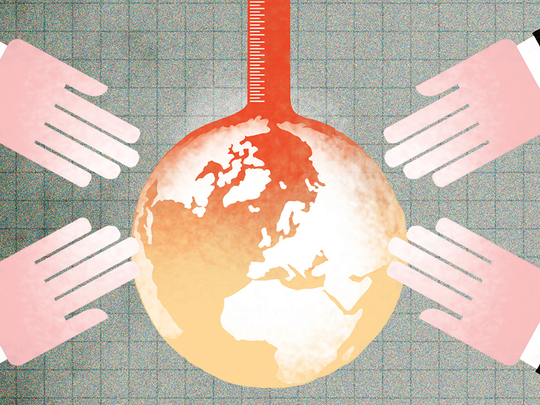
Some 150 world leaders are attending meetings in New York City for the landmark 70th United Nations General Assembly. One of the key achievements of the session, following Secretary-General Ban Ki-moon’s mini global-warming summit, is that much-needed momentum is building a new climate-change treaty that aims to be finalised in Paris in December.
The negotiations have been catalysed by major announcements in recent days by three of the world’s largest economies: China, India and the United States. Most prominently, Chinese President Xi Jinping and US President Barack Obama released on Friday a common vision document for securing a new global climate treaty in December, underpinned by a pledge that China will launch in 2017 a national carbon emission trading system covering power generation, steel, cement and other key industrial sectors.
This aligns with the recent decision by Obama to launch a US Clean Power Plan, which is the most comprehensive American action ever to tackle global warming. The US plan will set environmental rules and regulations to decrease pollution from power plants (which account for some 40 per cent of US emissions of carbon dioxide) in an attempt to reduce overall such US emissions by 32 per cent from 2005 levels from 2030.
The US-China announcement came on the same day that Indian Prime Minister Narendra Modi announced that his country will increase renewable energy output by five-fold by 2020, moving away from coal power, as part of a new comprehensive climate plan. And these moves by Washington, Beijing and New Delhi coincided with the historic visit to the US by Pope Francis, during which he launched a collective call for action on climate change, which follows the launch earlier this year of a papal encyclical that warned of “unprecedented destruction of ecosystems” and “serious consequences for all of us” if humanity fails to act on global warming.
The increased international resolve on climate change will be welcomed by many across the world and comes during a period when it may seem hard not to be pessimistic about the global battle to tackle global warming. However, far from this being the hopeless situation some depict, these latest developments underline that we may be reaching a point when the international tide is decisively turning to tackle climate change.
To be sure, much more needs to be done, including in the US and China. But if one steps back and examines what is happening at the national and sub-national levels across the world, a relatively positive picture is emerging. That is, domestic laws and regulations to address global warming are being passed at an increasing rate — in stark contrast to the progress in recent years in international negotiations.
In a report published this May by the Grantham Institute at the London School of Economics, it was revealed that there are more than 800 climate-change laws and policies now in place across the world, rising from 54 in 1997. Indeed, since 1997, when the Kyoto Protocol was agreed, the number of climate laws and policies has doubled every five years.
Approximately half of those (398) were passed by the legislative branch and half (408) by the executive branch (e.g. policies, decrees). And 46 new laws and policies were passed in 2014 alone.
A very clear signal
This is potentially nothing less than ‘game changing’ and reflects developments in both the industrialised and developing worlds, across every continent. For instance, China’s 12th Five-Year Plan gives a very clear signal about Beijing’s intent on climate, clean air and energy agendas. The Five-Year Plan includes policies and measures designed to help China achieve a 40-45 per cent reduction in the carbon intensity of gross domestic product from 2005 levels by 2020.
While this is a mammoth ambition that may not be fully realised, it is expected to be underpinned as a political commitment in Beijing’s first national climate-change law.
Indeed, it is mainly developing countries that will provide the motor of global economic growth in coming decades, which are leading this drive towards tackling global warming. Many are concluding it is in their national interest to reduce greenhouse gas emissions by embracing low-carbon growth and development and to better prepare for the impact of climate change.
They see that expanding domestic sources of renewable energy not only reduces emissions, but also increases energy security by reducing reliance on imported fossil fuels.
Reducing energy demand through greater efficiency reduces costs and increases competitiveness. Improving resilience to the impacts of global warming also makes economic sense. It follows, therefore, that advancing domestic climate legislation and regulations, and experiencing the co-benefits of reducing emissions, is a crucial building block to help create the political conditions to enable a comprehensive, global climate agreement from being reached.
Domestic laws give clear signals about direction of policy, reducing uncertainty, particularly for the private sector.
With negotiations on a post-2020 comprehensive global deal scheduled to conclude in December, an agreement, with the necessary ambition, is more likely to be reached with domestic frameworks, like the ones Obama and Xi have announced, in key countries. Sound domestic actions enhance the prospects of international action and better international prospects enhance domestic actions.
Given this outlook, and as potentially difficult international climate negotiations approach in December, a danger is that some countries may lower their long-term ambition. At a time when the climate-change debate is undergoing such change, this would be ill-timed. Indeed, Obama, Xi, Modi and the Pope have shown that now is the right time to invest more in tackling global warming, in order to help expedite conditions that will enable a comprehensive new treaty in December.
Andrew Hammond is an Associate at LSE Ideas (the Centre for International Affairs, Diplomacy and Strategy) at the London School of Economics and a former UK Government special adviser.










